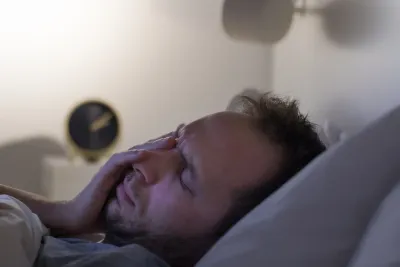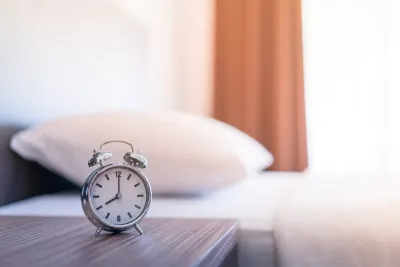Waking Up at Night? Learn Tips on How to Fall Back Asleep
Chilipad Editorial Team • Mar 05, 2024

Key Takeaways
Waking up at night is normal, and a few simple habits can help your body and mind ease back into sleep faster.
- Middle-of-the-night wakeups are common and often linked to normal sleep cycles, stress, or changes in your environment.
- Keeping your mind calm matters. Skip clock-watching and mental spirals in favor of slow breathing, muscle relaxation, or quiet mental cues.
- Phones are not your friend at 2 a.m. Screen light can interfere with melatonin and make falling back asleep harder.
- A cooler sleep setup helps signal sleep. Bedrooms between 60–67°F and cooling mattress solutions can support faster return to sleep.
- Evening habits count. Cutting back on late caffeine, heavy meals, and alcohol helps reduce nighttime disruptions.
Waking up in the middle of the night is more normal than you might think, a natural part of our sleep cycle. Often, we don't even recall these brief awakenings.
However, the real challenge arises when falling back asleep becomes a struggle. Instead of seamlessly slipping back into the coziness of our beds, we find our minds fully alert, leading to a night filled with restlessness and frustration.
Are you having trouble falling asleep? Don't worry; many practical strategies can help you discover how to fall back asleep fast, ensuring the restful, rejuvenating sleep you need and deserve.
Tips on How to Go Back to Sleep
Understanding the complex internal clock of our brain and body is key to achieving adequate sleep and peak performance during the day. This clock coordinates with different hours and organ activities, impacting our sleep and wakefulness. [1]
Working in sync with this rhythm can enhance our sleep quality, allowing us to rest and recharge effectively. Experts in the field of health and sleep science offer various scientifically-based recommendations for optimizing this natural sleep cycle.
Did You Know: If you wake up in the middle of the night, solid sleep hygiene can help you fall asleep faster—learn how to level up your nighttime habits with great sleep hygiene.
Don't Let Temperature Wake You Up
Dive into a deeper, more refreshing sleep with our bed cooling systems, the Chilipad Dock Pro or Cube. A cooler body temperature is key so you don't wake up hot. Our systems offer a temperature range from 55-115º, allowing you to find your perfect sleep setting.
Try Getting Out of Bed
If you find yourself tossing and turning, unable to sleep, a helpful tip is to get out of bed. Sleep experts suggest that if you're not asleep within 20 minutes, you should go to another room and engage in a calming activity. [2]
This could be reading or listening to soft music. The change of environment and activity can reset your mind, making it easier to feel sleepy when you return to bed. This technique helps break the cycle of lying awake and turning your bedroom back into a place of rest.
Keeping a sleep diary can help you keep track of how many times you wake up or get out of bed.
Sleep Study: According to a U.S. study, 35.5% of people wake up three or more nights per week. [3]
Avoid Clock Watching
When you're lying awake at night, it's tempting to keep glancing at the clock, counting down the hours until morning.
Continuously checking the clock when you can't sleep actually increases your anxiety, making it even more challenging to drift back into sleep. This habit tends to amplify your worries about lost sleep, creating a cycle of stress that keeps you awake longer. [4]
Worrying about how much sleep you're losing is common, but this only feeds into a cycle of stress and sleeplessness. For those who often feel anxious, especially about sleeping, avoiding the clock can help break this cycle.
Write Down Your Thoughts and Worries
Do you often find yourself struggling to fall asleep due to a racing mind filled with worries and thoughts? If so, try a simple and effective technique - writing. By taking some time before bedtime to jot down everything that's on your mind, you can help ease your mind and reduce stress levels.
Recent research has shown that journaling before bedtime can significantly impact sleep quality and mental health. [5]
Individuals who regularly engage in this practice have reported better sleep. So, if you're looking for a natural and easy way to manage stress and improve your sleep, consider adding journaling to your bedtime routine tonight.
A sleep expert often recommends keeping a pen and pad at your bedside so you can commit your worries to paper.
Sleep Tip: Set aside 15 minutes each night to write down positive thoughts and experiences and how you felt throughout the day. This can help "turn off" your brain and drift into a deep sleep.
Listen to Relaxing Music
Listening to music can be a helpful strategy. Soft, soothing music or sounds create a relaxing atmosphere, helping ease any tension or stress preventing sleep.
The gentle rhythms and melodies can distract your mind from anxious or repetitive thoughts, allowing your body and mind to relax. This relaxation is key for drifting back into sleep.
It's important to choose calming and not too stimulating music, as the goal is to create an environment conducive to improve sleep quality.
Sleep Tip: Relaxation techniques such as listening to music have been proven to help improve sleep. In a recent study, adults who listened to 45 minutes of music before going to sleep reported having a better quality of sleep starting on the first night. [6]
Reading Your Way Back to Sleep
Reading a book when you're having trouble falling back asleep can be beneficial. It's a gentle, calm activity that doesn't involve screens or blue light, which can disrupt sleep cycle.
Engaging in reading distracts your mind from the stress or anxiety that might be keeping you awake, helping you relax. Reading can shift your focus away from sleep-related worries, making it easier for your body to drift back into sleep naturally. Just make sure the content is calming and not overly stimulating or exciting!
Note: Reading a physical book can be a great alternative to reading an e-book in the middle of the night as the screens emit blue light. [7]
If you're glued to screens before bed, blue light blocking glasses might be your secret weapon for better sleep.
Listen to Podcasts
If you find reading inconvenient or uncomfortable due to poor lighting or eye strain, consider listening to podcasts or audiobooks.
These alternatives can provide you with an immersive and engaging experience without visual focus. However, selecting a topic that won't cause too much excitement or distress is important, as this can negatively impact your ability to relax or sleep.
So, when choosing your next audio content, be mindful of the potential emotional effects it may have on you.
If you're interested in discovering some great podcasts to add to your playlist, we've listed some of the best sleep advice podcasts, podcasts focusing on soothing sounds, and stories to help you return to dreamland.
Consistency in Sleep Schedule
Establishing a consistent sleep schedule can have numerous benefits for your health and well-being. Ideally, you should try to wake up and go to bed at the same time each day, even on weekends or days off. This helps regulate your body's internal clock, making it easier to fall asleep at night and wake up refreshed in the morning.
Of course, there will be times when you need to deviate from your usual routine - perhaps due to travel, holidays, or other special occasions. Don't worry too much when this happens, but try to get back on track as soon as possible. Your body will thank you for sticking to a consistent sleep schedule over the long term, resulting in better sleep.
Tip: Track your sleep patterns for a week or two—pay close attention to how long you're in bed versus how much of that time you're actually awake. Sleep patterns can uncover what’s helping—or hurting—your rest.
Deep Breathing
Mindfulness meditation is a cognitive training practice that coaches you to calm your mind and body by letting go of negativity and slowing down your racing thoughts.
Meditative deep breathing exercises and guided meditation encourage relaxation and self-compassion. This, in turn, can decrease stress levels. In a randomized clinical trial, practicing mindful meditation under the guidance of certified specialists improved the sleep quality of older adults. [8]
Meditation can help you reset your sleep by activating the parasympathetic nervous system, reducing heart rate and blood pressure, and promoting slow breathing.
Focus on Breathing
One of the effective techniques to calm your mind is through simple breathing exercises. By focusing on your breath and taking slow, deep breaths, you can reduce feelings of anxiety or stress.
This helps slow down your heart rate and regulate your body's response to stress. You can try inhaling deeply for a count of 4, holding your breath for a count of 7, and exhaling slowly for a count of 8. Repeat this pattern a few times, and you'll notice a difference in how you feel.
You can also try relaxation techniques such as deep breathing or progressive muscle relaxation.
Read More: The Benefits of Deep Breathing
Box Breathing
To practice box breathing, inhale slowly for a count of four. Hold your breath for another four counts. Then, exhale slowly for four counts. Finally, hold your breath again for four counts. Imagine tracing the sides of a square with your breath.
Repeat this pattern as many times as you'd like. If four seconds doesn't feel right, adjust the count to what works best for you.
Clear Your Mind - Write Down Your Thoughts
Worry is often what keeps us up at night. At 2 a.m., with no daytime distractions, our minds can easily start racing. Many sleep experts recommend keeping a pen and pad by your bed, so you can quickly jot down whatever’s on your mind.
Instead of the thoughts going over it again and again, write them down. This helps clear the mental clutter and lets you release those thoughts. Just remember to keep the lights low—using a flashlight or nightlight works best—since bright lights can throw off your body clock.
When To Ask For Help
If you continuously can't go back asleep, we recommend that you get evaluated by a sleep specialist or doctor, particularly if you notice increased anxiety, irritability, or decreased alertness during the day. Remember that approximately one-third of US adults have reported sleep problems. [9]
It's crucial that you get the support and professional consultation you need. You may have an underlying condition or illness that needs attention.
Common Sleep Factors
According to the CDC, a third of US adults (on average) aged 18 and over report not getting the recommended 7 hours of sleep per night.
For those aged 25 to 64, it's between 35.6% and 37.8%, [10] This figure is particularly striking because these age groups typically carry heavy responsibilities for caregiving of children and elders, shouldering financial burdens, and developing productive professional careers.
Consumer Reports Statistic: 27% of people in a new survey of 4,023 U.S. adults said they had trouble falling back asleep or staying asleep most nights. [11]
Final Thoughts
Waking up in the middle of the night doesn't have to mean a sleepless night. By trying out these tips, like reading a book, listening to calming music, or jotting down your thoughts, you can gently guide yourself back to a restful sleep. Remember, creating a relaxing sleep environment, and following a routine that suits your needs can make all the difference.
With a bit of patience and practice, you'll find your own unique ways to effectively fall back asleep and minimize sleep disturbances after waking up at night. It's about experimenting with different strategies and discovering what works best for you, ultimately creating a personalized approach to reclaiming those precious hours of restful sleep.
Frequently Asked Questions About Falling Back Asleep at Night
Why Is It So Hard to Fall Back Asleep?
It's different for each individual but is most likely associated with environmental or behavioral issues. It can include alcohol or caffeine a little too late in the evening, leading to bedtime.
But another common problem is due to poor sleep environment. If you feel it's been going on for some time, it's best to reach out to your primary doctor, as it could be the result of a sleep disorder. Want to make sure your room is optimized for sleep? Check out our blog for tips on properly designing your bedroom to improve your sleep.
Why Do I Wake Up at 2 AM and Can’t Go Back to Sleep?
Waking up at 2 AM can be frustrating. It's often caused by stress, anxiety, or poor sleep habits. To improve your sleep, you can try some things, including relaxing techniques before bed, creating a calming sleep environment, and limiting screen time.
There are several effective ways to get back to sleep if you wake up in the middle of the night. If these tips don't help, consider consulting a doctor to rule out any underlying medical conditions or sleep disorders such as sleep apnea.
Is It Okay to Look At My Phone if I Can’t Fall Back Asleep?
Not really. If you're struggling to return to dreamland, avoid looking at your phone or TV, as the blue light can interfere with melatonin production and trick your brain into thinking it's morning. Instead, keep the lights low and consider listening to calming music, a podcast, or an audiobook to help you relax.
Why Won’t My Body Let Me Go Back Asleep?
There are several reasons people may struggle with sleep, including bedtime habits, stress, chronic pain, and mental health disorders. To help you fall asleep, consider engaging in relaxing activities or listening to soothing sounds. However, if at-home remedies do not improve your sleep, it is advisable to consult a healthcare provider for persistent sleep issues.
Peer-Reviewed Research References
-
Hubbard, A.
How to Fall Back Asleep After Waking at Night.
Sleep Foundation, 2020.
Study Type: Evidence-Based Sleep Health Editorial
Key Finding: Brief nighttime awakenings are common, and strategies such as relaxation techniques, avoiding clock-watching, and maintaining consistent sleep habits can help people fall back asleep more easily.
View Resource
Source URL: https://www.sleepfoundation.org/how-sleep-works/how-to-fall-back-asleep
-
Vorvick, L.
Changing Your Sleep Habits.
MedlinePlus Medical Encyclopedia, 2022.
Study Type: Government Medical Education Resource
Key Finding: Improving sleep habits—including consistent bedtimes, limiting stimulants, and creating a calm sleep environment—supports better sleep continuity and quality.
View Resource
Source URL: https://medlineplus.gov/ency/patientinstructions/000757.htm
-
Ohayon, M. M., Krystal, A., Roehrs, T. A., Roth, T., & Vitiello, M. V.
Using Difficulty Resuming Sleep to Define Nocturnal Awakenings.
Sleep Medicine, 2010.
Study Type: Clinical Sleep Epidemiology Study
Key Finding: Difficulty returning to sleep after nighttime awakenings is a meaningful indicator of insomnia severity and overall sleep disruption.
View Study
Source URL: https://www.ncbi.nlm.nih.gov/pmc/articles/PMC2830306/
-
Scullin, M. K., Krueger, M. L., Ballard, H. K., Pruett, N., & Bliwise, D. L.
The Effects of Bedtime Writing on Difficulty Falling Asleep.
Journal of Experimental Psychology: General, 2018.
Study Type: Polysomnographic Experimental Study
Key Finding: Writing a to-do list before bed reduced sleep onset latency compared to writing about completed activities, suggesting cognitive offloading improves sleep initiation.
View Study
Source URL: https://www.ncbi.nlm.nih.gov/pmc/articles/PMC5758411/
-
Scullin, M. K., Krueger, M. L., Ballard, H. K., Pruett, N., & Bliwise, D. L.
Ibid.
Study Type: Polysomnographic Experimental Study
Key Finding: Cognitive pre-sleep strategies that reduce mental rumination may help prevent prolonged nighttime awakenings and difficulty falling asleep.
-
Lai, H.-L., & Good, M.
Music Improves Sleep Quality in Older Adults.
Journal of Advanced Nursing, 2005.
Study Type: Randomized Controlled Trial
Key Finding: Regular bedtime music listening improved sleep quality, reduced sleep latency, and decreased nighttime awakenings in older adults.
View Study
Source URL: https://onlinelibrary.wiley.com/doi/10.1111/j.1365-2648.2004.03281.x
-
Amirtharaj, A. D., Raghavan, D., & Arulappan, J.
Preferences for Printed Books Versus E-Books among University Students.
Heliyon, 2023.
Study Type: Observational Survey Study
Key Finding: Many students preferred printed books over e-books due to reduced eye strain and better focus, which may be relevant for bedtime reading and sleep preparation.
View Study
Source URL: https://www.ncbi.nlm.nih.gov/pmc/articles/PMC10248253/
-
Black, D. S., O’Reilly, G. S., Olmsted, R., Breen, E. C., & Irwin, M. R.
Mindfulness Meditation and Improvement in Sleep Quality.
JAMA Internal Medicine, 2015.
Study Type: Randomized Clinical Trial
Key Finding: Mindfulness meditation significantly improved sleep quality and reduced daytime impairment in adults with sleep disturbances.
View Study
Source URL: https://jamanetwork.com/journals/jamainternalmedicine/fullarticle/2110998
-
Pathek, N.
Waking Up in the Middle of the Night.
Cleveland Clinic, n.d.
Study Type: Clinical Health Education Resource
Key Finding: Middle-of-the-night awakenings may be linked to stress, sleep disorders, hormones, or environmental factors, and persistent symptoms should be evaluated medically.
View Resource
Source URL: https://health.clevelandclinic.org/waking-up-in-the-middle-of-the-night/
-
Centers for Disease Control and Prevention (CDC).
Sleep and Sleep Disorders.
CDC, n.d.
Study Type: Government Public Health Resource
Key Finding: Insufficient or disrupted sleep is associated with chronic disease risk, impaired cognition, and reduced quality of life across populations.
View Resource
Source URL: https://www.cdc.gov/sleep/index.html
-
Adjaye-Gbewonyo, D.
Sleep Duration and Sleep Difficulty Among Adults.
CDC National Center for Health Statistics, 2022.
Study Type: National Health Data Brief
Key Finding: A substantial proportion of U.S. adults report short sleep duration and frequent sleep difficulties, underscoring the prevalence of nighttime awakenings.
View Resource
Source URL: https://www.cdc.gov/nchs/products/databriefs/db436.htm









